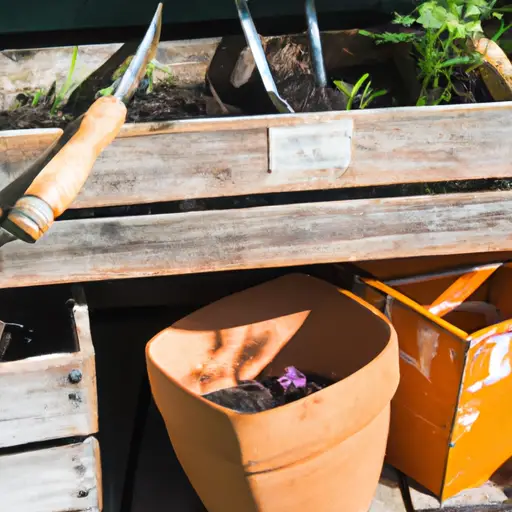Growing Herbs and Spices Made Easy with a Kitchen Garden
In recent years, there has been a growing interest among people in growing their own herbs and spices. The convenience and satisfaction of having fresh, aromatic ingredients right at your fingertips cannot be overstated. One of the best ways to achieve this is by starting a kitchen garden. A kitchen garden is a small plot of land or even just a few pots in your kitchen that allows you to grow a variety of herbs and spices that can be used in your cooking. In this article, we will discuss the benefits of starting a kitchen garden and provide some tips on how to get started.
One of the biggest advantages of growing your own herbs and spices is the assurance of their quality. When you purchase herbs from a store, you can never be completely sure of their freshness or the conditions in which they were grown. By growing your own, you have complete control over every aspect of their cultivation. You can ensure that they are grown organically, without the use of harmful pesticides or chemicals. This means that you will have access to fresh, healthy ingredients for all your culinary endeavors.
The convenience factor cannot be ignored either. With a kitchen garden, you can have an endless supply of freshly picked herbs and spices right at your fingertips. No more last-minute trips to the grocery store because you ran out of parsley or cilantro! Simply head to your kitchen garden and pick as much as you need. This not only saves time but also money in the long run. Buying packaged herbs from the store may seem cheaper initially, but they often go bad before you have a chance to use them all.
Another benefit of having a kitchen garden is the ability to experiment with different flavors and cuisines. Growing your own herbs opens up a world of possibilities when it comes to cooking. You can try out new recipes and add unique flavors to your dishes by using freshly harvested herbs and spices from your garden. This can greatly enhance the taste and quality of your meals, making cooking a more enjoyable experience overall.
Getting started with a kitchen garden is relatively easy and can be done even if you have limited space. The first step is to determine where you will set up your garden. If you have a small backyard, you can designate a corner or a portion of it for your herbs and spices. If outdoor space is not available, don’t worry! You can still grow herbs and spices indoors using pots or containers.
Once you have your space sorted out, the next step is to choose the herbs and spices you want to grow. Start with a few basics like basil, mint, rosemary, thyme, and parsley. These herbs are easy to grow and are commonly used in various dishes. As you gain confidence and experience, you can expand your garden to include more exotic varieties like lemongrass, sage or oregano.
It’s important to provide the right conditions for your plants to thrive. Most herbs require at least six hours of sunlight per day, so choose a location that receives adequate sunlight. If growing indoors, place your pots near a sunny window or use artificial grow lights. Ensure that the soil is well-draining by adding compost or perlite to the potting mix.
Regular watering is crucial for the health of your plants. Herbs generally prefer slightly moist but not waterlogged soil. A good rule of thumb is to water when the top inch of soil feels dry to the touch. Overwatering can lead to root rot while underwatering can cause wilting and stunted growth.
To keep pests at bay, practice good garden hygiene by removing dead leaves and debris regularly. This will help prevent diseases from spreading throughout your garden. Additionally, companion planting certain herbs like marigold or lavender can deter pests naturally.
Harvesting your herbs correctly ensures their continuous growth and productivity. As a general rule, it’s best to pinch off or cut the leaves just above a leaf node. This will encourage new growth and keep your plants bushy. Be sure to harvest in the morning when the essential oils are at their peak for maximum flavor.
In conclusion, growing herbs and spices in a kitchen garden is a rewarding and beneficial activity for any home cook. The ability to have fresh, high-quality ingredients at your fingertips not only enhances your cooking but also promotes a healthier lifestyle. With the right space, selection of plants, and proper care, anyone can enjoy the convenience and satisfaction of growing their own herbs and spices. So why not start your kitchen garden today and embark on an exciting journey of flavorful culinary exploration?














